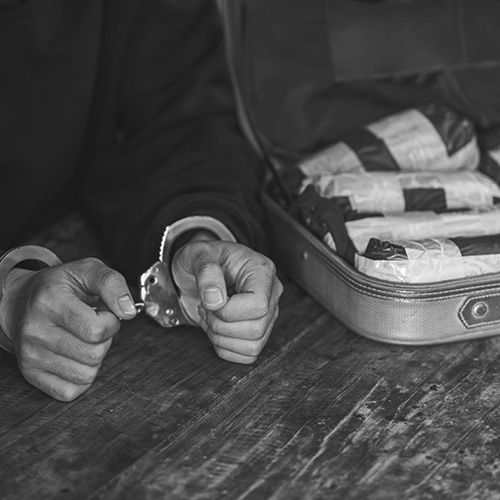
Advocates for cannabis decriminalization commonly argue that it will free up policing resources to focus on other, more serious offenses. But just over a year into California’s experiment with legalized marijuana, it appears that some cannabis-related crime has only increased, creating new challenges for law enforcement. Last month, the New York Times detailed how the state’s marijuana black market is still flourishing and even growing. Now, the Los Angeles Times reports that Los Angeles International Airport is an expanding hub for the illegal export of California cannabis, with a whopping 166% surge in pot smuggling arrests since legalization began.
This increase is not due to the fact that more Californians are carrying small amounts of marijuana for personal use, either because they forgot to remove it from their luggage before traveling or because they don’t understand the distinction between state and federal rules regarding the drug. Like other California peace officers, the Los Angeles Airport Police have no jurisdiction to arrest individuals who are complying with state law. That means people age 21 and older are allowed to possess up to 28.5 grams of marijuana or 8 grams of concentrated marijuana at LAX, as long as they don’t smoke it on airport premises. Once their planes take off, however, it’s a different story. The U.S. government still considers cannabis an illegal Schedule I narcotic, so it’s prohibited in federal airspace and interstate travel. Californians who leave the state with marijuana can still face arrest or charges at their destinations in other states or countries where it’s illegal. California has also outlawed exporting marijuana to other states.
Since the Transportation Security Administration is part of the federal government, its airport screening stations are under federal jurisdiction. When TSA agents find marijuana on a person or in their luggage, they’re instructed to report the violation to law enforcement. Airport police then determine whether the suspect is complying with California law. When officers make arrests, it’s usually because fliers are clearly trying to smuggle large amounts of cannabis out of the state — their luggage loaded with vacuum-sealed packages, often hidden by wax paper, tinfoil or gift wrapping or disguised as candy or other foods. In one example mentioned in the L.A. Times article, TSA employees opened five suitcases belonging to two Newark-bound passengers and found more than 100 pounds of cannabis products.
The problem is that California has a cannabis surplus. Since medical marijuana was legalized here almost two decades ago, the industry has been thriving with minimal oversight; now, many businesses see little incentive to go through the burdensome process of obtaining a legal license. California is the top producer of marijuana in the U.S., growing about 14 million pounds per year, far more than its residents actually consume. In 2017, the University of California Agricultural Issues Center estimated that up to 80% of the pot grown here is shipped elsewhere. That means the state is missing out on a huge portion of the tax revenue that was supposed to be another selling point of legalization. This month, it scaled back how much it expected to receive from cannabis sales through 2020 by $223 million, as marijuana continues to leak across its borders to flood other markets.
Most cannabis leaves California by car or truck, but commercial air travel appears to be a method that’s growing in popularity. LAX police made 20 marijuana trafficking arrests in 2016 and 38 in 2017; that number jumped to 101 for 2018, the first year of legalization, and other airports around the state have reported a similar trend. Many of the suspects specifically stated that they had flown to California to buy better and cheaper marijuana and sell it for a profit back home. A pound of pot that costs $600 to $800 in California can be resold for $4,000 in the Midwest, notes an industry spokesman in the L.A. Times story. And under current law, the consequences for trafficking cannabis are fairly light — even someone stopped at an airport with two checked bags full of marijuana can get away with a simple misdemeanor charge if they don’t have a history of drug or violent offenses.
While marijuana offenses remain a lower enforcement priority compared to more immediate dangers like heroin trafficking and violent crime, it’s clear that many of the promised benefits of legalization have failed to materialize. Meanwhile, the problems are playing out precisely as many public safety advocates warned, creating the potential for what one regulator quoted in the New York Times called a “Drug War 2.0.”
“It’s hardly surprising that legalizing recreation marijuana has led to a rise in crime throughout our state and our airports,” says LAAPOA President Marshall McClain. “Instead of allowing law enforcement to concentrate our efforts more fully on other pressing threats, this shortsighted initiative has emboldened criminal traffickers, and we now have to allocate our very limited resources to ensure that LAX and Van Nuys Airport don’t become gateways for drug smuggling into other parts of the country. As the force policing the world’s fourth-largest airport, our members will continue to be vigilant in enforcing existing laws and protecting passenger safety to the best of our abilities.”
